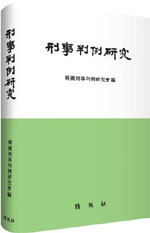- 영문명
- Regarding Cases of Procedural Violation in Witness Testimony and Whether it Constitutes a Defense to the Crime of Perjury: Focusing on the Failure to Inform the Witness about the Right to Refuse Testimony
- 발행기관
- 한국형사판례연구회
- 저자명
- 이희경(Lee, Hee Kyung)
- 간행물 정보
- 『형사판례연구』형사판례연구 제19권, 468~508쪽, 전체 41쪽
- 주제분류
- 법학 > 법학
- 파일형태
- 발행일자
- 2011.06.30
7,720원
구매일시로부터 72시간 이내에 다운로드 가능합니다.
이 학술논문 정보는 (주)교보문고와 각 발행기관 사이에 저작물 이용 계약이 체결된 것으로, 교보문고를 통해 제공되고 있습니다.

국문 초록
영문 초록
Criminal procedure holds the discovery of substantive truth as its highest value. However, this fact-finding function cannot be the sole aim of criminal procedure to be attained at all costs. Rather, it is constrained by the principles of due process and a timely trial. Therefore, although the Criminal Code provides for the crime of perjury which deters witnesses from hindering a fair trial with false testimony, the Criminal Procedure Code partially concedes the fact-finding function of criminal procedure by providing for the witness’s right to refuse testimony as a function of due process. This right to refuse testimony is enforced by the obligation to inform the witness on the existence of this right. The question is, if the judge questions a witness in violation of the right to refuse testimony and the obligation to inform, and the witness makes a false statement under oath, can the witness be punished for perjury? This is a question of weighing the values of substantive truth and the principle of due process when they are in contradiction, as due process is the source of the right to refuse testimony and, in certain circumstances, constitutes a limit on the ideal of substantive fact-finding. The decisions in this study take the position that the standard for finding a witness guilty on perjury should be whether there has been an actual hindrance to exercise the right to refuse testimony due to the failure to inform. In this sense, the cases give more weight to the due process considerations of witness examination than previous Korean Supreme Court cases. However, the studied cases are incorrect in limiting the affirmative defense to perjury to those cases where the failure to inform resulted in an actual hindrance to exercise the right. The witness is an individual who bears the obligation to appear at court even though it is not the witness’s own trial, swear a legally binding oath, and testify, all in the interest of substantive fact-finding. The Criminal Procedure Code obligates these witnesses to give testimony, but also gives them the right to refuse testimony where the witness may incriminate himself or herself or close family members. The obligation to inform the witness of this right forms a procedural safeguard to enforce the right. Therefore, the presiding judge’s failure to inform the witness of the existence of the right is a violation of due process and the testimony is given illegally, meaning the witness should not be found guilty of perjury even if the testimony was false. The obligation to inform the witness of the right to refuse testimony exists to guarantee the right to refuse testimony by reminding the witness of the right, thereby giving the witness the ample opportunity to reached an informed decision on whether to stay silent or testify. Therefore, the obligation to inform (Article 160 of the Criminal Procedure Code) guarantees the exercise of this right even when the witness does not know he or she has this right, or is ignorant of how to exercise the right. If the presiding judge violates this regulation and compels the witness to testify without informing the witness that the witness has the right not to testify, such an act on the judge’s part is far more than a minor infraction that has no effect on the legal existence of the crime of perjury. In the cases where the court has failed to inform the holder of the right to refuse testimony, there is no expectation that the witness in question will not commit perjury. It is worth noting that the newly amended Criminal Procedure Code now provides for the exclusion of illegal evidence, and due process is increasingly important at trial as well as during the investigative phase. Therefore, a failure to adhere to laws protecting the witness, especially the failure to inform the witness of a right to refuse testimony should be a full defense to the crime of perjury.
목차
Ⅰ. 문제의 제기
Ⅱ. 위증죄와 증인의 소송법상 권리와의 관계
Ⅲ. 증언거부권자와 위증죄의 성립여부
Ⅳ. 글을 마치며
키워드
해당간행물 수록 논문
- 진술거부권 행사와 증거이용금지 및 피의자신문권과의 관계
- 전직한 종업원의 영업비밀 사용과 업무상 배임죄
- 배임죄와 사기죄의 경합관계
- 아이템 거래 판결에 대한 고찰
- 절도죄의 객체로서 재물의 ‘재산적 가치’에 대한 검토
- 위치추적 전자장치 부착명령과 불이익변경금지
- 증언절차의 소송법 규정위반과 위증죄의 성립여부
- 형의 실효의 법률적 효과
- 불법적 · 반윤리적 목적의 승낙과 상해
- 영업범의 개념과 죄수관계
- 심신장애 판단과 감정
- 2010년도 형법판례 회고
- 협박의 의미와 대상
- 성풍속범죄에 대한 비판적 고찰
- 고소인이 간통죄의 제1심 판결 선고 후 피고소인과 다시 혼인한 경우 등과 간통고소의 효력
- 부동산 명의수탁자의 횡령죄 주체성
- 디지털 증거의 진정성립부인과 증거능력 부여 방안
- 건설산업기본법 위반죄(부정취득)와 배임수재죄의 관계
- 환자의 전원(轉院)에 있어서의 의료과실
- 권리․권한실행 의사표시의 협박죄 성립





